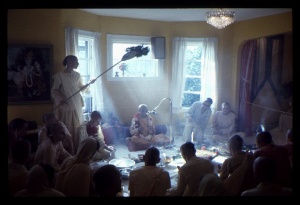CC Madhya 17.14 (1975): Difference between revisions
(Vanibot #0027: CCMirror - Mirror CC's 1996 edition to form a basis for 1975) |
(Vanibot #0020: VersionCompareLinker - added a link to the Version Compare feature) |
||
| Line 2: | Line 2: | ||
<div style="float:left">'''[[Sri Caitanya-caritamrta (1975)|Śrī Caitanya-caritāmṛta (1975)]] - [[CC Madhya (1975)|Madhya-līlā]] - [[CC Madhya 17 (1975)|Chapter 17: The Lord Travels to Vṛndāvana]]'''</div> | <div style="float:left">'''[[Sri Caitanya-caritamrta (1975)|Śrī Caitanya-caritāmṛta (1975)]] - [[CC Madhya (1975)|Madhya-līlā]] - [[CC Madhya 17 (1975)|Chapter 17: The Lord Travels to Vṛndāvana]]'''</div> | ||
<div style="float:right">[[File:Go-previous.png|link=CC Madhya 17.13 (1975)|Madhya-līlā 17.13]] '''[[CC Madhya 17.13 (1975)|Madhya-līlā 17.13]] - [[CC Madhya 17.15 (1975)|Madhya-līlā 17.15]]''' [[File:Go-next.png|link=CC Madhya 17.15 (1975)|Madhya-līlā 17.15]]</div> | <div style="float:right">[[File:Go-previous.png|link=CC Madhya 17.13 (1975)|Madhya-līlā 17.13]] '''[[CC Madhya 17.13 (1975)|Madhya-līlā 17.13]] - [[CC Madhya 17.15 (1975)|Madhya-līlā 17.15]]''' [[File:Go-next.png|link=CC Madhya 17.15 (1975)|Madhya-līlā 17.15]]</div> | ||
{{CompareVersions|CC|Madhya 17.14|CC 1975|CC 1996}} | |||
{{RandomImage}} | {{RandomImage}} | ||
==== TEXT 14 ==== | ==== TEXT 14 ==== | ||
<div class="verse"> | <div class="verse"> | ||
:nūtana saṅgī ha-ibeka, | :nūtana saṅgī ha-ibeka,--snigdha yāṅra mana | ||
:aiche yabe pāi, tabe la-i | :aiche yabe pāi, tabe la-i 'eka' jana | ||
</div> | </div> | ||
| Line 25: | Line 24: | ||
<div class="translation"> | <div class="translation"> | ||
"Such a person must be a new man, and he must have a peaceful mind. If I can obtain such a man, I shall agree to take him with Me." | |||
</div> | </div> | ||
| Line 32: | Line 31: | ||
<div class="purport"> | <div class="purport"> | ||
When Śrī Caitanya Mahāprabhu formerly went to South India, a brāhmaṇa named Kālā Kṛṣṇadāsa went with Him. It was Kālā Kṛṣṇadāsa who fell victim to a woman, and Śrī Caitanya Mahāprabhu had to take the trouble to free him from the clutches of the gypsies. Therefore the Lord here says that He wants a new man who is peaceful in mind. One whose mind is not peaceful is agitated by certain drives, especially sex desire, even though he be in the company of Caitanya Mahāprabhu. Such a man will become a victim of women and will fall down even in the company of the Supreme Personality of Godhead. Māyā is so strong that unless one is determined not to fall victim, even the Supreme Personality of Godhead cannot give protection. The Supreme Lord and His representative always want to give protection, but a person must take advantage of their personal contact. If one thinks that the Supreme Personality of Godhead or His representative is an ordinary man, he will certainly fall down. Thus Śrī Caitanya Mahāprabhu did not want a person like Kālā Kṛṣṇadāsa to accompany Him. He wanted someone who was determined, who had a peaceful mind and who was not agitated by ulterior motives. | |||
</div> | </div> | ||
Latest revision as of 10:30, 27 January 2020

A.C. Bhaktivedanta Swami Prabhupada
TEXT 14
- nūtana saṅgī ha-ibeka,--snigdha yāṅra mana
- aiche yabe pāi, tabe la-i 'eka' jana
SYNONYMS
nūtana—new; saṅgī—associate; ha-ibeka—must be; snigdha—very peaceful; yāṅra—whose; mana—mind; aiche—such; yabe—if; pāi—I get; tabe—then; la-i—I take; eka jana—one person.
TRANSLATION
"Such a person must be a new man, and he must have a peaceful mind. If I can obtain such a man, I shall agree to take him with Me."
PURPORT
When Śrī Caitanya Mahāprabhu formerly went to South India, a brāhmaṇa named Kālā Kṛṣṇadāsa went with Him. It was Kālā Kṛṣṇadāsa who fell victim to a woman, and Śrī Caitanya Mahāprabhu had to take the trouble to free him from the clutches of the gypsies. Therefore the Lord here says that He wants a new man who is peaceful in mind. One whose mind is not peaceful is agitated by certain drives, especially sex desire, even though he be in the company of Caitanya Mahāprabhu. Such a man will become a victim of women and will fall down even in the company of the Supreme Personality of Godhead. Māyā is so strong that unless one is determined not to fall victim, even the Supreme Personality of Godhead cannot give protection. The Supreme Lord and His representative always want to give protection, but a person must take advantage of their personal contact. If one thinks that the Supreme Personality of Godhead or His representative is an ordinary man, he will certainly fall down. Thus Śrī Caitanya Mahāprabhu did not want a person like Kālā Kṛṣṇadāsa to accompany Him. He wanted someone who was determined, who had a peaceful mind and who was not agitated by ulterior motives.